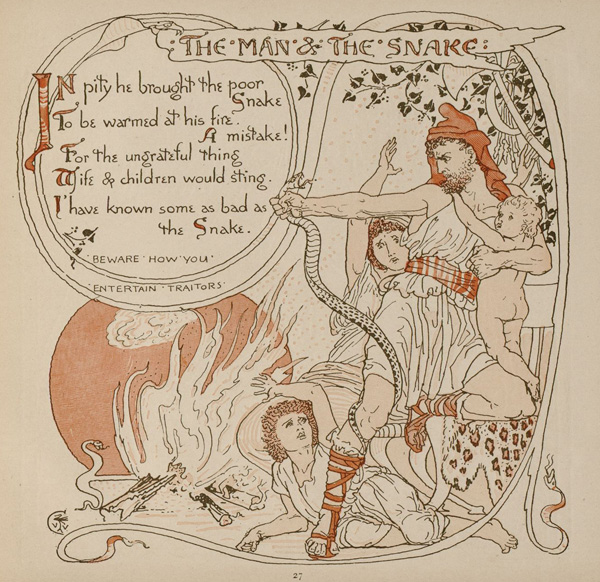1. κούφη ~ κούφης (adj. fem.): light, nimble
2. ψυχρός ~ ψυχροῦ (adj. masc.): cold, frozen
3. ταὐτόν ~ ταὐτοῦ (adj. neut.): the same, selfsame
4. ἀκριβής ~ ἀκριβοῦς (adj. masc.): accurate, precise
5. νέος ~ νέου (adj. masc.): young, new
Here are the proverbs and sayings:
Κούφη γῆ τοῦτον καλύπτοι.
Ψυχρὸν ἐν κόλπῳ ποικίλον εἶχες ὄφιν.
Δὶς ἐξαμαρτεῖν ταὐτὸν οὐκ ἀνδρὸς σοφοῦ.
Ὀφθαλμοὶ τῶν ὤτων ἀκριβέστεροι μάρτυρες.
Οὐδεὶς βάλλει οἶνον νέον εἰς ἀσκοὺς παλαιούς.
Listen at SoundCloud.
Plus some commentary:
Here is Walter Crane's illustration for Aesop's fable about the frozen snake:
Κούφη γῆ τοῦτον καλύπτοι.
May the earth cover him lightly.
This is a Greek epitaph; the earth referred to here is the earth of the grave. The adjective κούφη can mean light in the sense of quick or nimble, and it can also mean light in the sense of easy, not heavy, which is the meaning here. The verb καλύπτοι is in the optative mood. You can see the Greek root καλύπτ- in the word apocalypse, which means "uncovering" in Greek, as in the title of the Book of Revelation in the Bible with its apocalyptic contents.
Ψυχρὸν ἐν κόλπῳ ποικίλον εἶχες ὄφιν.
You kept a frozen speckled snake in your bosom.
The saying appears in one of the elegies of Theognis, a sixth-century poet; the word ποικίλον, "speckled," is included here for poetic rather than proverbial purposes. There is an Aesop's fable that tells the story: on a cold winter day, a man picks up a snake that is stiff with cold; he puts it inside his cloak to warm it, and when the snake thaws, it bites the man and he dies. In other versions, the man takes the snake home and warms it by the fire; the snake them rises up and attacks the man and his family (see illustration below).
Δὶς ἐξαμαρτεῖν ταὐτὸν οὐκ ἀνδρὸς σοφοῦ.
A wise man does not make the same mistake twice.
Literally, "To twice mistake the same (thing) is not of a wise man." Note the internal breathing mark, which indicates that this is a contraction; you will see both ταὐτό and ταὐτόν (as here) used for the neuter form. The saying is another one of the "one-liners" of Menander in iambic verse:
Δὶς ἐξ-αμαρ—τεῖν ταὐ-τὸν οὐκ — ἀνδρὸς - σοφοῦ.
From Greek ταὐτο- we get English tautology.
Ὀφθαλμοὶ τῶν ὤτων ἀκριβέστεροι μάρτυρες.
The eyes are more accurate witnesses than the ears.
In other words, you can believe what you see for yourself; you cannot always believe what others tell you, a.k.a. hearsay. The adjective ἀκριβέστεροι is comparative, so it takes a genitive complement: "than the ears," τῶν ὤτων.
Οὐδεὶς βάλλει οἶνον νέον εἰς ἀσκοὺς παλαιούς.
No one puts new wine into old wine-skins.
The saying comes from a parable in the Gospel of Luke, and it also appears in Matthew and in Mark. You can find out more about this parable at Wikipedia: New Wine into Old Wineskins. You can see the Greek root νέο- in all the neo- words in English, like neonatal and neologism. And yes, this is also where the chemical element neon gets its name, plus there's Neo, of course, from the Matrix. :-)
Here is Walter Crane's illustration for Aesop's fable about the frozen snake:

No comments:
Post a Comment